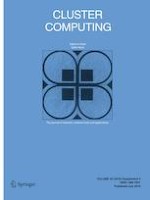05-07-2017
Is collective intelligence helps more in polysemy tag optimazed algorithm than commonsense tool
Published in: Cluster Computing | Special Issue 4/2019
Log inActivate our intelligent search to find suitable subject content or patents.
Select sections of text to find matching patents with Artificial Intelligence. powered by
Select sections of text to find additional relevant content using AI-assisted search. powered by
